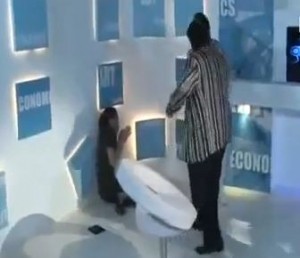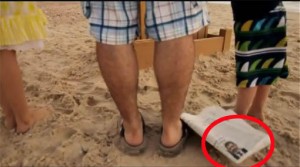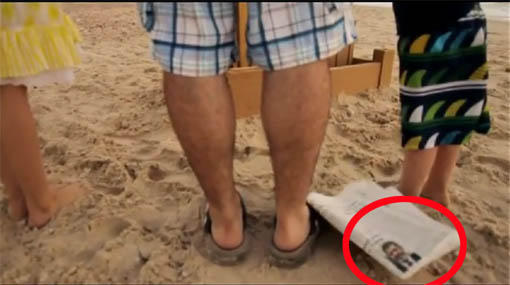An Egyptian candid camera-style television show is “inciting public opinion against peace,” and “vindictive” and would not be broadcast in Israel, Ofir Gendelman, spokesperson to the Arab media in the Israeli Prime Minister’s office remarked on Twitter yesterday.

Gendleman was referring to the programme “The Verdict After Judgment,” broadcast daily during the month of Ramadan on the Al-Nahar channel. The prank show masquerades as a foreign (alternately German or French) talk show and draws in prominent Egyptian personalities to appear on the show. Once present, the host, who deliberately speaks in a strange accent, asks questions that increasingly pertain to Israel, the peace agreement and other hotbed topics.
After a few planted prompts including fake callers and a foreign-looking producer, the guest realises that something is wrong, and is then told that the show is in fact aired on Israeli “Channel Two,”and that the entire staff is Israeli. Responses by guests have varied from rage to outright violence. When the guests are told the truth, the studio audience applauds.
Gendleman’s response is the latest in a series of mounting media confrontations in already-tense Egyptian-Israeli relations.”Just on a basic personal level, I object to this,” says Dr Naila Hamdy, an Assistant Professor of Journalism and Mass Communication at the American University in Cairo. “It is cheap programming that creates extra unnecessary hatred.”
Only days ago, the Temple Institute (an Israeli non-profit organisation) released an advertisement calling for the rebuilding of the demolished Temple of Solomon. Rebuilding the temple could result in the demolition of the Al Aqsa Mosque due to their proximity.
The advertisement shows two children building a sandcastle and calling their father over to look at it. Upon seeing it, the father drops the newspaper he was reading, leaving president Morsy’s prominently-displayed face resting in the sand.

The image was not well-received among Egyptian audiences. State-run media reported on the advertisement, describing it as “offensive” and quoting presidential spokesperson Yasser Ali as saying that President Morsy had ordered the Ministry of Foreign Affairs to investigate the matter.
According to Dr Hamdy, the backlash is the result of a simple misunderstanding of Internet material.
“It is not a government affiliated organisation that ran the ad. It is the equivalent as if a right-wing Egyptian party ran a similar ad here,” Hamdy says. “We need to learn to be more media literate, especially as we have more freedom now.”
The escalating situation may portend badly for future Israeli-Egyptian relations. Morsy has only just assumed the presidency and either a failure to rein in potentially offensive television shows or his allowance of Israeli ads to tarnish his name could be perceived as weaknesses in the first ever official disagreement between Israel and Egypt with Morsy at the helm.
The adverse effects of this potential ‘media war’ could be blown way out of proportion, however.
“Any ‘crisis’ as they’re calling it between two presidents is going to be about more than a tacky Ramadan talk show,” says Hamdy about claims of potential escalation. “You’d need a hundred, a trend, of these incidents. They aren’t exactly number one on our priorities list.”
